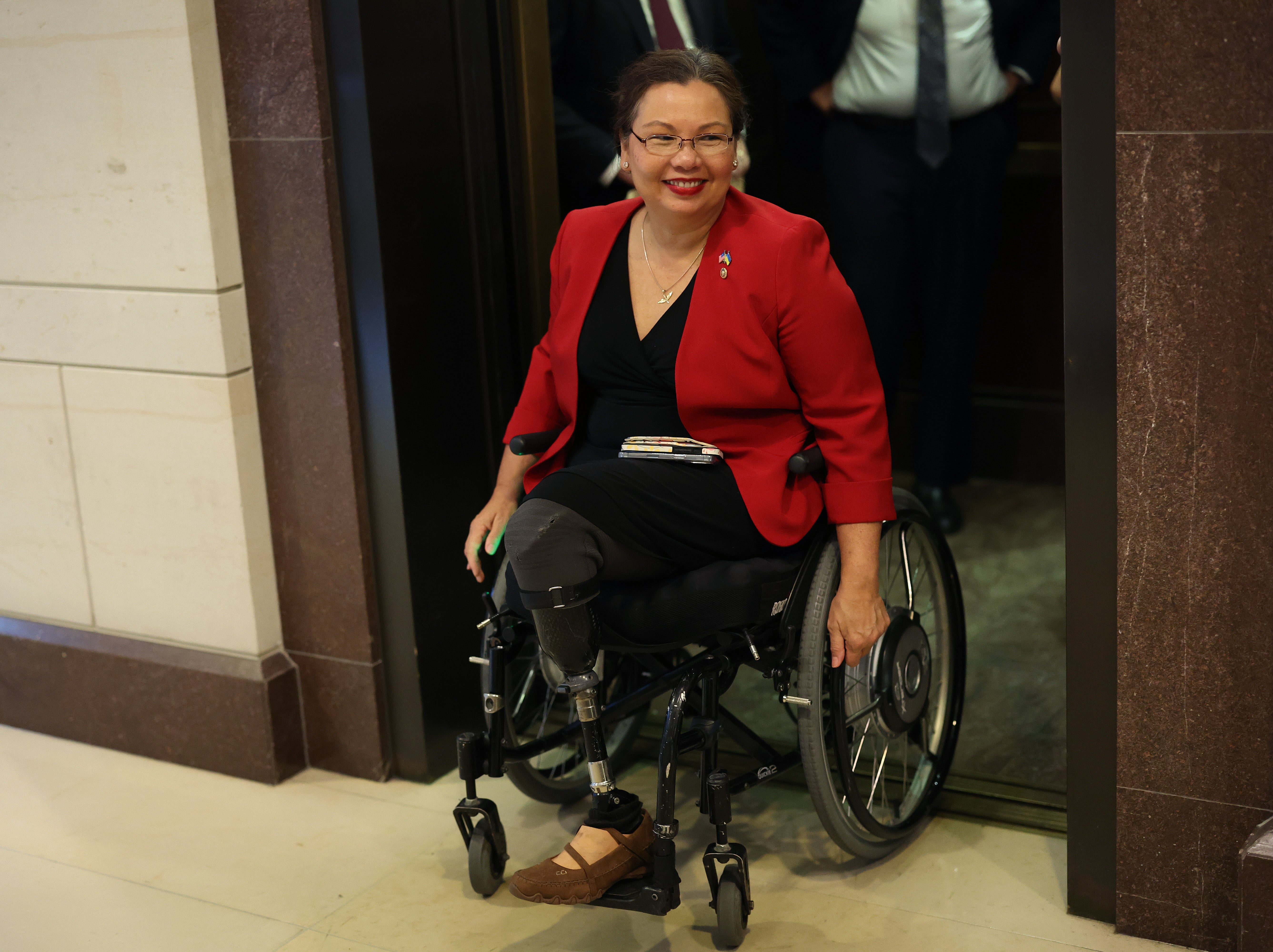Activists fear a case before the Supreme Court could destroy the Americans with Disabilities Act
The conservative majority of the Supreme Court has some disability rights activists worried that the 33-year-old law could be significantly weakened
Does a person with a disability need to face physical discrimination from a hotel to warrant a lawsuit or is the hotel’s failure to provide their accessibility information online enough? What if they have no intention of visiting the hotel?
It’s a distinction that the Supreme Court will have to decide in the case of Acheson Hotels LLC v Deborah Laufer, should they even decide to rule on the initial question presented.
The case, which the Court agreed to hear in March, was raised by Deborah Laufer, a woman living with multiple sclerosis . She filed a lawsuit against Acheson Hotels LLC for failing to provide accessibility information for their hotel in Maine.
“It’s as if you went up to a reservation desk in a wheelchair and the hotel had a practice of just ignoring anyone in a wheelchair telling them to just call a number,” Kelsi Brown Corkan, the attorney representing Ms Laufer said during oral arguments on Wednesday.
“There is a dignity harm in being treated as invisible and not as a potential participant in the marketplace,” she added. Laufer acknowledges that she had no intention of staying at the hotels.
Like any Supreme Court case, there are some complications. But at its core, the case raises concerns about information accessibility online.
Ms Laufer acts as a self-appointed “tester” for other people living with disabilities to ensure hotels are acting in accordance with the Americans with Disabilities Act (ADA), the 1990 law meant to protect the rights of people with disabilities and make public establishments more accessible.
After being diagnosed with multiple sclerosis at 40, she noted the difficulty in finding accessible travel and chose to file hundreds of lawsuits against hotels for failing to provide accessible information online.
One of the more than 500 she filed included Coast Village Inn and Cottages, a small hotel once owned by Acheson Hotels LLC.
But Acheson Hotels refuted Ms Laufer’s claims, saying she did not face harmful discrimination because she had no intention of visiting.
“In this case, we think what really happened here was that there was a bar to accessing the hotel which doesn’t become relevant until the plaintiff actually tries to do that,” Adam Unikowsky, the attorney representing Acheson Hotels LLC, said on Wednesday.
Justices Brett Kavanaugh and Neil Gorsuch both questioned how someone experiences discrimination on a website, seemingly empathizing with Mr Unikowsky’s perspective.
Former senator Tom Harkin, one of the chief sponsors of the ADA, said the ADA Amendments Act of 2008 addressed these questions about websites.
“And that's there in terms of accessibility of technology, websites, everything else,” Mr Harkin, who retired from the Senate in 2015, told The Independent. “They're supposed to be accessible. I don't know about testing. But why can't she check and see if they're accessible or not?”
On the other hand, Justice Sonia Sotomayor, who has Type 1 diabetes, pointed out how the internet has had a pivotal role in providing necessary information to people with disabilities and a lack of accessibility may be a problem.
The Court will need to ruminate on these points to determine an answer to the question presented, another issue is humming in the background: whether the case is even worth ruling on.
Over the summer, Ms Laufer withdrew her lawsuit against Acheson Hotels after her former attorney received disciplinary action for improper conduct because he misrepresented the work he did related to ADA lawsuits.
As a result, Ms Laufer filed a motion to have the case dismissed – something she did to avoid tainting the suit to appear less legitimate in her fight to advocate for people with disabilities, according to The Washington Post.
But Acheson Hotels asked the court to oppose Ms Laufer’s motion, despite the company no longer operating the hotel that the lawsuits initially targeted.
Part of Mr Unikowsky’s arguments is that the Court should set a precedent to no longer allow people like Ms Laufer to file hundreds of lawsuits against companies and then settle to receive money.
In a filing, Mr Unikowsky said “These lawsuits burdened small businesses, clogged the judicial system, and undermined the Executive Branch’s exclusive authority to enforce federal law.”

The court hearing comes just days after President Joe Biden hosted an event at the White House celebrating the 33rd anniversary of the Americans with Disabilities Act and the 50th anniversary of the Rehabilitation Act.
In a sign of how inaccessible even events meant to celebrate people with disabilities were, the event was held on the South Lawn of the White House with only two runways laid out for people with disabilities, meaning some people had to push extra hard to move through the grass.
Mr Biden spoke about the increase in accessibility that has come for people with disabilities since the two landmark laws, both of which he co-sponsored in the US Senate, passed.
But many disability rights activists expressed concern about the fact the law for which they celebrated could be unraveled.
"We certainly want to make sure that the ADA survives everything,” Representative Jan Schakowsky of Illinois told The Independent. “So, you know, to the extent that it could be a bad judgment of the Supreme Court, I’m hoping that the justices will see better.”
Should the Court decide to issue a ruling on the original question presented, a decision in favour of Acheson Hotels could limit the ability of ADA “testers” to hold places of public accommodation accountable in their accessible information online.
Senator Tammy Duckworth, who lost both her legs when her helicopter was shot while serving in Iraq, expressed concern about the case.
“We’ll see how it goes, but I think we’ve got a good case,” she told The Independent during the event at the White House. Ms Duckworth has spoken out previously about how she continues to face discrimination for her disabilities.
At an event in July with the American Association of People with Disabilities, Ms Duckworth spoke about how she went to see the “Barbie” movie with her daughters but was not able to see it since the cinema staff only told her that the elevator was broken after she purchased their tickets.

The latest Supreme Court case comes as the Biden administration has implemented new rules to expand protections for people with disabilities. Last week, the National Institute on Minority Health and Health Disparities announced that it would designate people with disabilities as a population with health disparities, which would open up federal dollars for research.
In July, the Department of Transportation announced a new rule that would require airline toilets be more accessible for people with disabilities.
Susan Mizner of the ACLU’s Disability Rights Program said in a press release that, “absent robust federal monitoring and enforcement, civil rights testers fill a critical role in ensuring businesses nationwide are in compliance with the ADA’s accessibility requirements.”
"I think it’s already tenuous the way you know how we can actually get the law enforced," Jim LeBrecht, a disability rights activist and filmmaker who directed the Academy Award-nominated movie “Crip Camp,” told The Independent.
Mr LeBrecht criticised how Mr Unikowsky argued that people with disabilities should make “a polite phone call or email” to hotels to update their accessibility information online than a lawsuit.
"I am truly without words hearing that because the law has been around for a long time," Mr LeBrecht said. “The people that actually spent the money to become accessible, how dare they try to defend themselves by saying: Well, if you were more polite about this. They just didn’t want to do it.”
Join our commenting forum
Join thought-provoking conversations, follow other Independent readers and see their replies
Comments





Bookmark popover
Removed from bookmarks